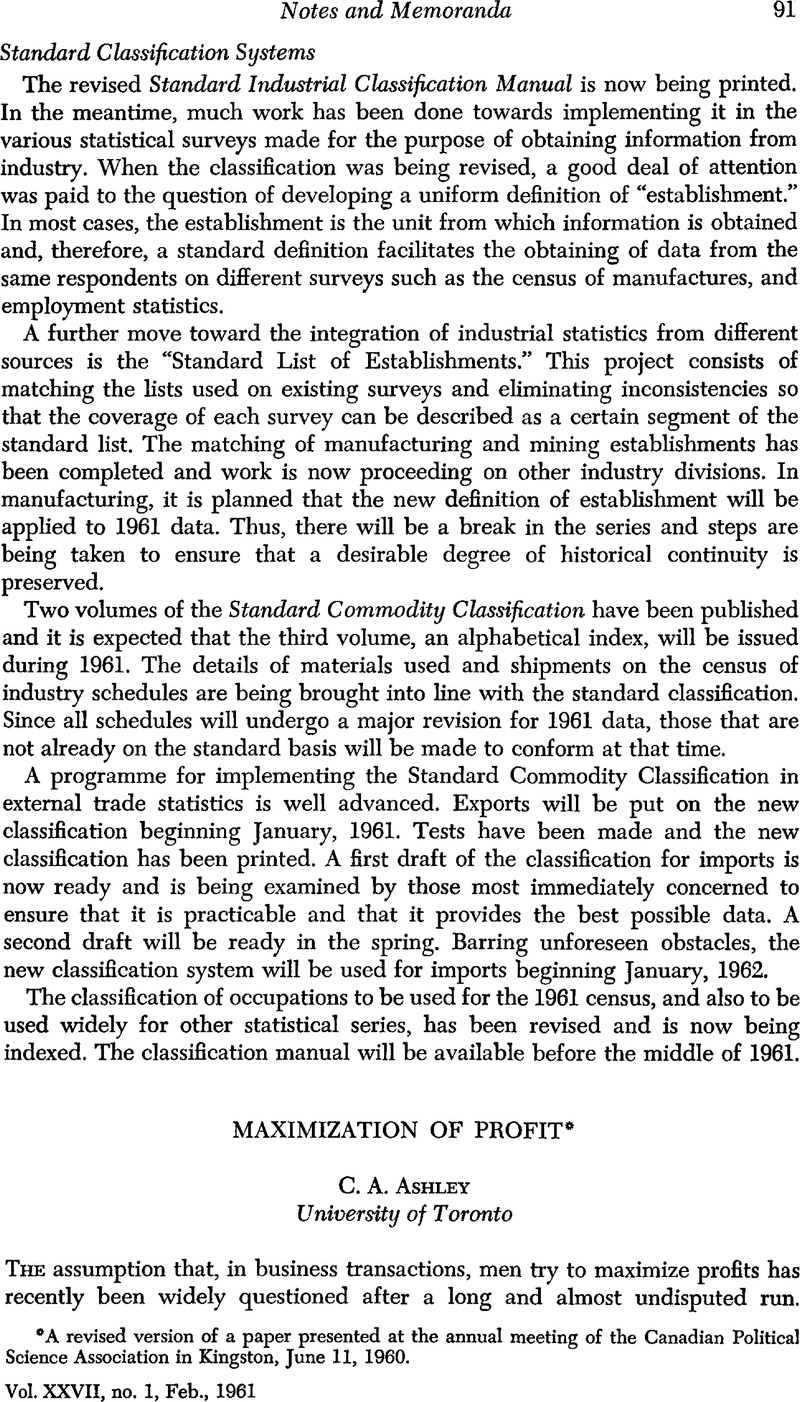No CrossRef data available.
Published online by Cambridge University Press: 07 November 2014

A revised version of a paper presented at the annual meeting of the Canadian Political Science Association in Kingston, June 11, 1960.
1 Lewis, W. A., The Theory of Economic Growth (London, 1956), 38.Google Scholar
2 Quoted in Robbins, L., The Theory of Economic Policy (London, 1952), 62.Google Scholar
3 See Ashley, C. A., “The Business Man in Fiction,” Commerce Journal, 1956, 71–81.Google Scholar
4 Knight, F. H., Risk, Uncertainty and Profit (London, 1933), 53.Google Scholar See also Ryan, W. J., Price Theory (London, 1958), 24 Google Scholar; and Mannheim, K., Man and Society (London, 1940), 315.Google Scholar
5 Robbins, , The Theory of Economic Policy, 206.Google Scholar See also Ashley, C. A. and Smyth, J. E., Corporation Finance in Canada (Toronto, 1956).Google Scholar
6 Dean, J., Managerial Economics (New York, 1956), 28.Google Scholar See also Bowen, H. R., Social Responsibilities of the Businessman (New York, 1953)Google Scholar, passim; and Demant, V. A., Religion and the Decline of Capitalism (London, 1952), chap. VI.Google Scholar
7 Machlup, F., “Marginal Analysis and Empirical Research,” American Economic Review, XXXVI, no. 4, 09, 1946, 528.Google Scholar
8 Andrews, P. W. S., Manufacturing Business (London, 1949), 4.Google Scholar
9 Keirstead, B. S., Capital, Interest and Profits (New York, 1959), 58.Google Scholar
10 Boulding, K. E., The Skills of an Economist (Cleveland, 1958), 59.Google Scholar
11 Friedman, M., Essays in Positive Economics (Chicago, 1953), 21.Google Scholar
12 Robinson, J., Economics of Imperfect Competition (London, 1953), 16.Google Scholar
13 Ibid., 213.
14 Brech, R., “Economics in Business,” Advancement of Science, XV, no. 61, 482.Google Scholar
15 Boulding, , The Skills of an Economist, 61.Google Scholar
16 Robinson, E. A. G., “The Pricing of Manufactured Products,” Economic Journal, 12, 1950, 774.Google Scholar
17 Friedman, , Essays, 22.Google Scholar
18 Scitovsky, T., Welfare and Competition (Chicago, 1951), 111.Google Scholar
19 “The Scope and Method of Economics,” Review of Economic Studies, XIII, 2.Google Scholar
20 “The peculiar feature of the imputation of motives is that we are asserting a nexus between an overt action and a purely subjective factor that cannot be exposed to any kind of direct scrutiny and is not as such manifest in action.” McIver, R. M., Social Causation (Boston, 1942), 203.Google Scholar
21 Price Theory, 69.
22 Essays, 220.
23 Ibid., 36.
24 Innis, H. A., Essays in Economic History (Toronto, 1956), 21.Google Scholar
25 “Imperfect Competition Revisited,” Economic Journal, 09, 1953, 582.Google Scholar
26 “A Note of Profit Maximization and Its Implications,” Review of Economic Studies, XI, no. 1, 57.Google Scholar
27 “Choice in Psychology and Economic Assumption,” Economic Journal, 06, 1953, 357.Google Scholar
28 Capitalism, Socialism and Democracy (New York, 1942), 160.Google Scholar See also Weber, Max, The Methodology of the Social Sciences (Glencoe, Ill., 1949), 36.Google Scholar